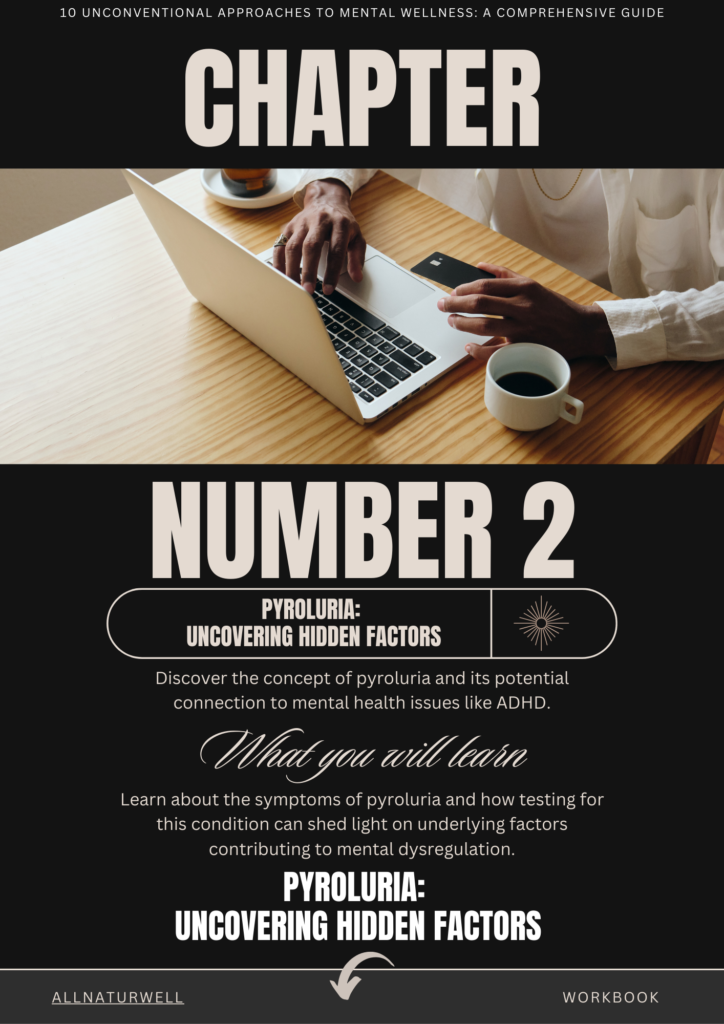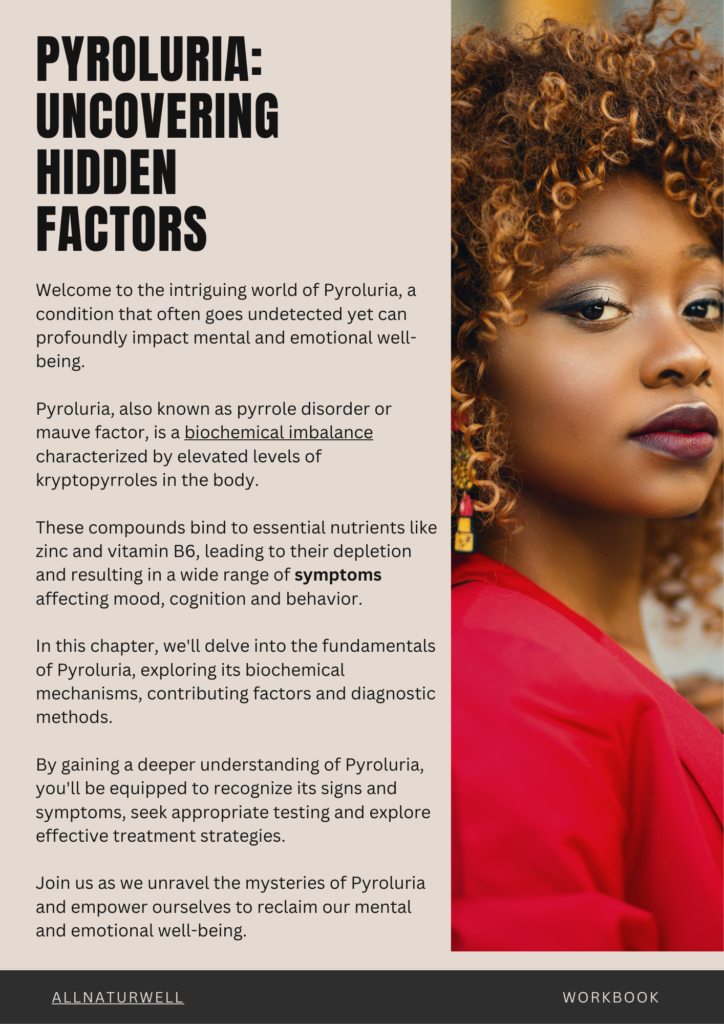Pyroluria in women with ADHD and/or Bipolar Disorder is often overlooked.
Knowing Pyroluria’s Impact on Women with ADHD/Bipolar Disorder might cause a brow to raise for some, but for the woman (or man or child) suffering daily with this condition, it should definatley cause pause to investigate.
Let’s start with a few simple questions:
Can, or does, the overproduction of pyrroles contribute to ADHD or bipolar disorder?
Yes, the overproduction of pyrroles, specifically hydroxyhemopyrrolin-2-one (HPL) associated with pyroluria, is believed to greatly contribute to conditions like ADHD and bipolar disorder. Pyroluria is a genetic condition where the body produces excess HPL, which binds to vitamin B6 and zinc, leading to their excretion from the body. Both vitamin B6 and zinc play crucial roles in neurotransmitter function and overall brain health.
Pyroluria in Women
The depletion of these essential nutrients, particularly B6, can affect the synthesis of neurotransmitters like serotonin and dopamine. Disruptions in neurotransmitter balance are linked to various mental health conditions, including ADHD (Attention Deficit Hyperactivity Disorder) and bipolar disorder. Therefore, addressing pyroluria through nutritional interventions, such as supplementation of B6 and zinc, is considered a potential strategy in managing symptoms associated with these conditions.
With that said, let’s ask the next ‘obvious’ question: When people are ‘diagnosied’ with adhd or bipolar disorder, are they immediately tested for pyroluria or vitamin B6 and zinc deficencies?
Ironically, the answer is no.
Testing for pyroluria or specific nutrient deficiencies like vitamin B6 and zinc is not typically a standard part of the diagnostic process for ADHD or bipolar disorder. Diagnosing these conditions often involves clinical assessments, behavioral observations and interviews to evaluate symptoms and their impact on daily life.
While some healthcare practitioners may consider additional testing, such as nutrient assessments, if they suspect a nutritional component or if the individual presents with certain symptoms, it’s not a routine part of the diagnostic process. Diagnostic criteria for ADHD and bipolar disorder are generally based on established guidelines that focus on behavioral and psychological assessments.
So, let’s take a closer look for ourselves.
Pyroluria in Women
Pyroluria in Women, ADHD and Bipolar Disorder
Living with undiagnosed ADHD or bipolar disorder can be challenging, and the journey to understanding and managing these conditions often involves exploring various aspects of one’s health. One often overlooked factor that can play a crucial role is pyroluria – an abnormal metabolic condition that may contribute to symptoms associated with these disorders.
READ: Brain Energy by Christopher M. Palmer, MD, a Harvard psychiatrist and researcher working at the interface of metabolism and mental health. He expresses that mental disorders are actually metabolic disorders of the brain. Palmer also sheds light on the new treatment pathways this theory opens up—which apply to all mental disorders, including anxiety, depression, ADHD, alcoholism, eating disorders, bipolar disorder, autism, and even schizophrenia.
The Connection: Pyroluria is linked to the overproduction of pyrroles, affecting the synthesis and metabolism of hemoglobin. While it might sound complex, its impact on mental health, especially in women with ADHD or bipolar disorder, is worth exploring. Pyrroles can bind to essential nutrients like vitamin B6 and zinc, creating deficiencies that further exacerbate symptoms.
Symptoms and Recognition: Understanding the symptoms associated with pyroluria is a crucial step. For women dealing with undiagnosed ADHD or bipolar disorder, common signs like heightened anxiety, mood swings and stress intolerance might be familiar. These symptoms can significantly overlap with those of pyroluria, making it a potential contributor to the overall mental health picture.
The symptoms of Pyroluria that overlap with ADHD and/or Bipolar Disorder include:
Emotional Instability: Individuals with Pyroluria may experience emotional volatility, mood swings, and heightened sensitivity to stress, resembling symptoms seen in both ADHD and Bipolar Disorder.
Impaired Concentration: Difficulty focusing, maintaining attention, and organizing thoughts are common in Pyroluria, mirroring ADHD symptoms.
Anxiety and Depression: Pyroluria is associated with increased anxiety and depressive symptoms, which are also prevalent in individuals with ADHD and Bipolar Disorder.
Impulsivity: Impulsive behavior and decision-making challenges are shared traits among ADHD, Bipolar Disorder, and Pyroluria.
Sleep Disturbances: Insomnia, difficulty falling asleep, or disrupted sleep patterns are symptoms present in all three conditions.
Memory Issues: Memory impairment, particularly short-term memory problems, is observed in individuals with Pyroluria, resembling cognitive challenges in ADHD and certain phases of Bipolar Disorder.
Social Difficulties: Individuals with Pyroluria may struggle with social interactions and relationships, echoing social challenges often seen in ADHD and certain aspects of Bipolar Disorder.
Attention and Hyperactivity: Pyroluria may contribute to attention difficulties and hyperactivity, similar to symptoms associated with ADHD.
It’s essential to recognize that while these symptoms overlap, they are not exclusive to Pyroluria, ADHD, or Bipolar Disorder. Additionally, individuals can experience a combination of these conditions, further complicating the symptom picture.
Pyroluria in Women
The Importance of Testing: Recognizing the possible link between pyroluria and mental health challenges, especially in the context of ADHD and bipolar disorder, prompts the importance of testing. Specific urine tests can identify elevated *kryptopyrroles, providing valuable insights into whether pyroluria might be a contributing factor to the existing challenges.
- Genetic Testing is also available. Conditions like pyroluria are also linked to MTHFR. Pyroluria arises from a deficiency in essential nutrients, triggered by pyrroles binding to vital vitamins and minerals in the bloodstream, notably Vitamin B6, Zinc, and essential fatty acids. Consequently, the body struggles to effectively utilize these nutrients, impacting both the brain and digestive system. Pyroluria is frequently misidentified as schizophrenia, manic depression, or bipolar disorder. Learn more here.
Addressing Pyroluria: If pyroluria is identified, addressing it becomes crucial for comprehensive mental health management. Supplementation with active forms of vitamin B6 and zinc, along with dietary adjustments, can help restore nutrient balance and alleviate symptoms associated with pyroluria and ADHD and/or bipolar disorder.
*Kryptopyrroles, also known as hydroxyhemopyrrolin-2-one (HPL), are chemical compounds that form in the body and can be excreted in urine. They are often referred to in the context of Pyroluria, a condition believed to be associated with an abnormal synthesis and metabolism of hemoglobin.
In individuals with Pyroluria, an excessive production of kryptopyrroles occurs. These compounds have an affinity for certain nutrients, specifically zinc and vitamin B6. When kryptopyrroles bind to these nutrients, they are excreted in the urine, leading to deficiencies of zinc and vitamin B6 in the body.
Learn More / Chapter 2 / 10 Unconventional Approaches To Empower Your Mental Wellness
Correcting Pyroluria in Women Holistically
Correcting the imbalance associated with pyroluria involves a seemingly straightforward treatment regimen, including zinc, vitamin B6 or pyridoxal 5-phosphate (activated B6), GLA (an essential omega-6 fatty acid found in evening primrose, borage, and black currant oil), vitamin E and magnesium. But it’s not quite that simple.
While this could serve as a good starting point, attempting to self-prescribe without personalized guidance can pose risks. Each individual’s body requires varying levels of these nutrients and self-medicating may lead to unintended consequences. It’s crucial to note that reintroducing these nutrients after an absence might initially accelerate enzymatic processes, possibly causing detoxification or the release of latent infections.
Self-medicating is NOT advisable, as B6 and zinc toxicity may arise, especially if the body struggles to utilize these nutrients effectively. Experienced oversight from a practitioner IS essential. For instance, magnesium deficiency can hinder B6 absorption, and improper ratios of zinc and B6 may disrupt stomach acid production, potentially worsening the situation.
Numerous other factors make self-prescribing a perilous endeavor. It is never wise and never encouraged here. Even though one might feel they can suddenly see a light at the end of the tunnel doesn’t mean there aren’t mountains to climb yet before getting there. Pyroluria in women should always be addressed with your doctor. Seeking guidance from a natural health practitioner familiar with pyroluria ensures a comprehensive approach, balancing nutrient levels, managing detox and addressing underlying stressors effectively.
Pyroluria in Women
Empowering women with undiagnosed ADHD or bipolar disorder involves looking beyond conventional diagnoses. Exploring potential factors like pyroluria adds a new dimension to the understanding of mental health. It’s a call to action – to seek appropriate testing, embrace a holistic approach to well-being and address underlying imbalances that may have been overlooked.
Conclusion: On the journey toward better mental health, it’s essential for women to be proactive in exploring various aspects that may contribute to their unique experiences. Pyroluria, with its potential connection to ADHD and bipolar disorder symptoms, is a puzzle piece worth examining and discussing with your doctor. By shedding light on this connection, we empower women to take charge of their mental health journey and embark on a path of comprehensive self-discovery and well-being.
YOU MAY BE INTERESTED IN:
Disclaimer: The information and/or products mentioned in these article are provided as information resources only and are not to be used or relied on to diagnose, treat, cure or prevent any disease. The statements made in this article have not been evaluated by the Food and Drug Administration. Any products mentioned are not intended to diagnose, treat, cure, or prevent any disease, but rather to be considered as an informational resource only to encourage critical thinking and personal research. The information in this article is intended for educational purposes only. The information is not intended to replace medical advice offered by licensed medical physicians. Please consult your doctor or health care practitioner for any and all medical advice.
and don't forget to sign up for our weekly newsletter. it's free!

52 Weeks, 52 Topics! Get Our Latest ‘Stay Well’ Newsletter Every Monday And Start Your Week Off AllNaturWell. A New Tip, A New Study Revealed, A New Product Reviewed. Get It Right To Your Inbox Weekly. No Need To Wait. It’s Free!







